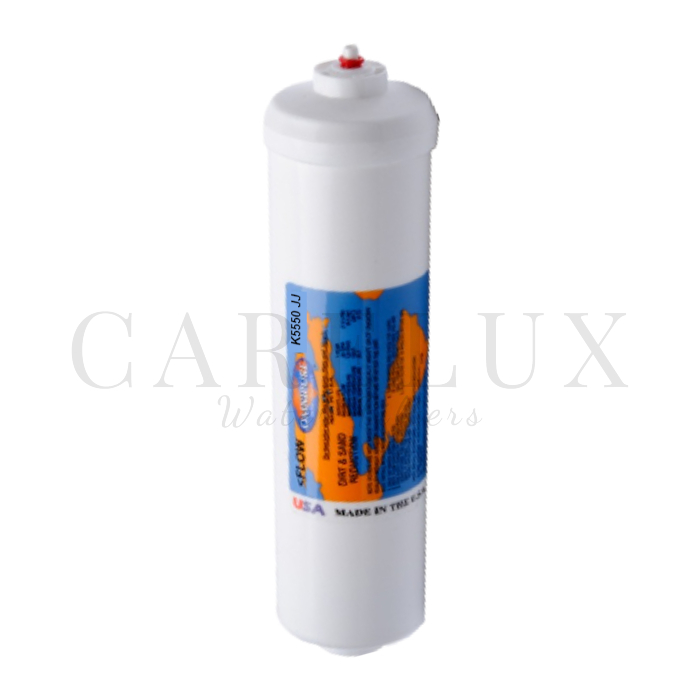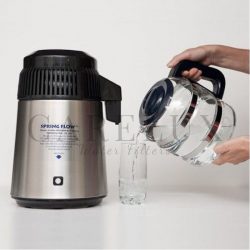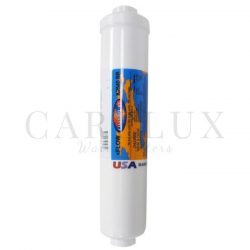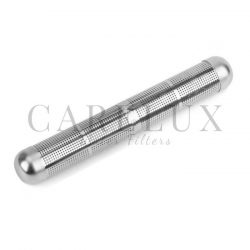Description
This is the K-Series Omnipure K5555 JJ Resin Inline Filter.
- Ion Exchange Resin Inline Filter
- 1/4″ JJ Quick Connection
- Omnipure K-Series Model
- MPN: K5555-JJ
- Manufactured by Omnipure
- Made in USA
- 10″ x 2.5″ Inline Filter
- Highly effective at reducing Total Dissolved Solids or TDS from water as well as other contaminants.
- Lowers conductivity
- 5 Micron pore size
- Softens hard water by exchanging the magnesium and calcium ions found in hard water with other ions such as sodium or hydrogen ions.
- Omnipure K-Series Model
Brand
Omnipure
Omnipure is a world class manufacturer of inline water filters and filter cartridges in the USA.
They produce over a dozen unique series of filters offering solutions to nearly any point of use water filtration problem.
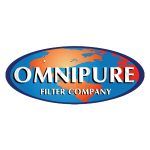
Specifications
Omnipure K5555-JJ
| Flow Rate |
0.5 gpm |
| Maximum Operating Pressure |
125 psig |
| Operating Temperature |
2 to 38 ºC35 to 100 ºF |
| Rated Capacity |
230 Grains |
| Reduction Claim |
TDS reduction, lowers conductivity |
| Flow Capacity |
2,000 gal |
Performance Data Sheet.pdf
About TDS
 What Is TDS?
What Is TDS?
The term “TDS” is an acronym for Total Dissolved Solids when referring to water. This means the amount of ‘inorganic salts’ which can be found in water. Basically speaking, this is anything that contaminates the purity of the water. Some of these solids can cause a huge amount of health issues. TDS salts include calcium, potassium, chloride, sulfates and many more.
These end up within our water for a variety of reasons. Water is rarely totally pure, and even natural processes can lead to minerals or other solids ending up in the water. Not all are harmful, but some certainly are. Many solids enter our water supply from human processes such as agriculture, water treatments and even wastewater getting into water supplies.
What does a High TDS Mean?
A high TDS is an indicator of the quality of the water. Having high TDS doesn’t always mean that water is harmful. For instance, some mineral water has high levels of solids within and this is not seen as harmful, but that is because the actual solids are. These are usually calcium, magnesium or other substances which may not be bad for the body.
A high TDS can also be caused by harmful items such as chlorine, sulfates and more. The measurement is a guideline rather than a specific way to tell if water is high quality or not.
If the high TDS is down to more harmful contaminants being in your water, it can be a serious risk to human health. High TDS can also mean ‘hard’ water, which is far more likely to cause limescale or other build-ups and deposits on pipes or appliances around the home, shortening their lifespan.
Sources of Information on TDS
Filtration Process
Ion exchange is a process used to soften hard water by exchanging the magnesium and calcium ions found in hard water with other ions such as sodium or hydrogen ions. Unlike scale inhibition, ion exchange physically removes the hard minerals, reducing limescale and making water suitable for applications where it is kept at a constant high temperature e.g. in commercial coffee machines.
Ion exchange is most commonly carried out using an ion exchange resin which normally comes in the form of small beads. A similar type of resin is used in some Water Softeners and in the case of a water softener the resin utilises sodium ions which need to be periodically recharged to prevent the resin becoming ineffective.
Resins that utilise sodium ions aren’t usually used in drinking water filters as the amount of salt (sodium) that can be present in drinking water is legally limited to 200 milligrams/litre. As sodium ion exchange increases salt levels, a hydrogen based ion exchange resin is the preferred option for filters.

